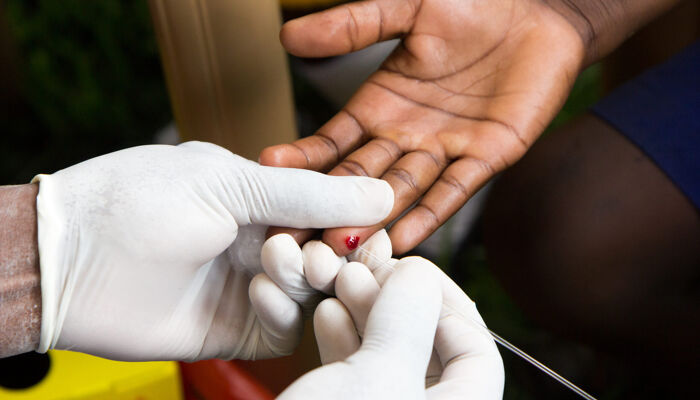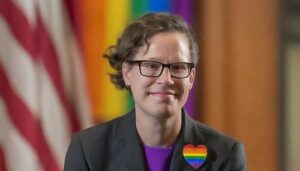Uganda’s anti-gay law is making nearly impossible for LGBTQ+ people to get the healthcare they need
Uganda’s Anti-Homosexuality Act is making it nearly impossible for LGBTQ+ people in the East African nation to access the healthcare they need.
Brian Aliganyira, the 36-year-old founder of Ark Wellness Hub, a health clinic for the LGBTQ+ community in Kampala, Uganda, told The Guardian this week that the law has led to a narrative in the country that facilities like his are “recruiting children into homosexuality.”
The Anti-Homosexuality Act, signed by Ugandan President Yoweri Museveni last May, has been called one of the most extreme examples of anti-LGBTQ+ legislation in the world. It made what is described in the law as “aggravated homosexuality” punishable by the death penalty, imposed a life sentence for “recruitment, promotion and funding” of same-sex “activities,” and even banned identifying as LGBTQ+.
In April, Uganda’s Constitutional Court ruled against parts of the law — including a provision that made it a crime to fail to report homosexual acts to authorities — but upheld its draconian punishments for LGBTQ+ people. Ugandan LGBTQ+ activists have appealed the ruling.
Aliganyira explained that providing healthcare services tailored to LGBTQ+ people’s needs — providing condoms and lubricants or sexual health information — could lead to a charge of “promoting” homosexuality under the law.
Ark Wellness Hub has had to remove leaflets aimed at the gay community, and staff can no longer have frank conversations about sexual health with patients. Three members of the clinic’s staff quit last year due to the country’s anti-LGBTQ+ climate.
“So many threats from outside. Also some of their families were telling them to quit that kind of job, because it was illegal,” Aliganyira told The Guardian.
He says anti-LGBTQ+ propaganda has led many in the community to either assume the clinic is unable to operate or made them too fearful to come in.
“The whole propaganda, the whole debate led to the decrease in terms of clients accessing services. They were scared. They feared coming to the clinic. They feared even being called for things like follow-up,” he says. “Clients who used to come and pick up test kits would not pick them up. Clients who were living with HIV had trouble coming back and picking [up] their ARVs.”
Meanwhile, Anti-Homosexuality Act has led to an even greater need for LGBTQ+-focused healthcare. The law has exacerbated anti-LGBTQ+ sentiment in Uganda, causing queer people to lose jobs, be evicted from their homes, and lose support from family. Aliganyira says that some people have turned to sex work or have become dependent on abusive partners.
Misinformation about healthcare has also proliferated unchecked. One patient came into the clinic for a PrEP prescription and returned each month for refills. When he tested positive for HIV on his fourth visit, Aliganyira learned that the patient never actually took the medication; he had been persuaded that it would turn him into a woman.
Another couple living with HIV in a refugee camp have been forced to travel eight hours by bus to the clinic for their antiretroviral medication.
Aliganyira says his clinic had to arrange for a transgender woman to receive treatment at a private facility after she’d been attacked last year. When she showed up at a hospital, staff called the press instead of treating her, and she ended up in a coma due to brain swelling.
“That shows you how much homophobia supersedes the value of someone else’s life,” Aliganyira said.
At the same time, online propaganda falsely accusing the clinic of “recruiting” children has also made staff weary of new patients, fearing they might be “spies.” Aliganyira says people have come in asking if the clinic can connect them with “a sugar daddy,” possibly because they believe they can make clinic staff admit that they have violated the law.
Last summer, Uganda’s national NGO regulator visited the clinic to grill Aliganyira and his staff about their operation. “They asked questions around our registration, what our primary purpose is… like trying to figure out loopholes in our legal existence,” Aliganyira says.
As it becomes harder for LGBTQ+ people to get healthcare, Aliganyira says he worries that rates of HIV and other sexually transmitted infections will rise along with rates of mental health problems. “I do see a lot of problems coming, and I do see them right now,” he says.

Uganda’s Anti-Homosexuality Act is making it nearly impossible for LGBTQ+ people in the East African nation to access the healthcare they need.
Brian Aliganyira, the 36-year-old founder of Ark Wellness Hub, a health clinic for the LGBTQ+ community in Kampala, Uganda, told The Guardian this week that the law has led to a narrative in the country that facilities like his are “recruiting children into homosexuality.”
The Anti-Homosexuality Act, signed by Ugandan President Yoweri Museveni last May, has been called one of the most extreme examples of anti-LGBTQ+ legislation in the world. It made what is described in the law as “aggravated homosexuality” punishable by the death penalty, imposed a life sentence for “recruitment, promotion and funding” of same-sex “activities,” and even banned identifying as LGBTQ+.
In April, Uganda’s Constitutional Court ruled against parts of the law — including a provision that made it a crime to fail to report homosexual acts to authorities — but upheld its draconian punishments for LGBTQ+ people. Ugandan LGBTQ+ activists have appealed the ruling.
Aliganyira explained that providing healthcare services tailored to LGBTQ+ people’s needs — providing condoms and lubricants or sexual health information — could lead to a charge of “promoting” homosexuality under the law.
Ark Wellness Hub has had to remove leaflets aimed at the gay community, and staff can no longer have frank conversations about sexual health with patients. Three members of the clinic’s staff quit last year due to the country’s anti-LGBTQ+ climate.
“So many threats from outside. Also some of their families were telling them to quit that kind of job, because it was illegal,” Aliganyira told The Guardian.
He says anti-LGBTQ+ propaganda has led many in the community to either assume the clinic is unable to operate or made them too fearful to come in.
“The whole propaganda, the whole debate led to the decrease in terms of clients accessing services. They were scared. They feared coming to the clinic. They feared even being called for things like follow-up,” he says. “Clients who used to come and pick up test kits would not pick them up. Clients who were living with HIV had trouble coming back and picking [up] their ARVs.”
Meanwhile, Anti-Homosexuality Act has led to an even greater need for LGBTQ+-focused healthcare. The law has exacerbated anti-LGBTQ+ sentiment in Uganda, causing queer people to lose jobs, be evicted from their homes, and lose support from family. Aliganyira says that some people have turned to sex work or have become dependent on abusive partners.
Misinformation about healthcare has also proliferated unchecked. One patient came into the clinic for a PrEP prescription and returned each month for refills. When he tested positive for HIV on his fourth visit, Aliganyira learned that the patient never actually took the medication; he had been persuaded that it would turn him into a woman.
Another couple living with HIV in a refugee camp have been forced to travel eight hours by bus to the clinic for their antiretroviral medication.
Aliganyira says his clinic had to arrange for a transgender woman to receive treatment at a private facility after she’d been attacked last year. When she showed up at a hospital, staff called the press instead of treating her, and she ended up in a coma due to brain swelling.
“That shows you how much homophobia supersedes the value of someone else’s life,” Aliganyira said.
At the same time, online propaganda falsely accusing the clinic of “recruiting” children has also made staff weary of new patients, fearing they might be “spies.” Aliganyira says people have come in asking if the clinic can connect them with “a sugar daddy,” possibly because they believe they can make clinic staff admit that they have violated the law.
Last summer, Uganda’s national NGO regulator visited the clinic to grill Aliganyira and his staff about their operation. “They asked questions around our registration, what our primary purpose is… like trying to figure out loopholes in our legal existence,” Aliganyira says.
As it becomes harder for LGBTQ+ people to get healthcare, Aliganyira says he worries that rates of HIV and other sexually transmitted infections will rise along with rates of mental health problems. “I do see a lot of problems coming, and I do see them right now,” he says.


